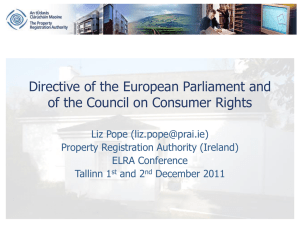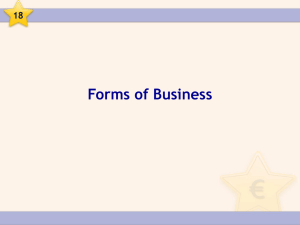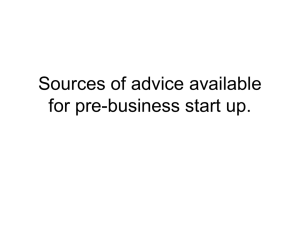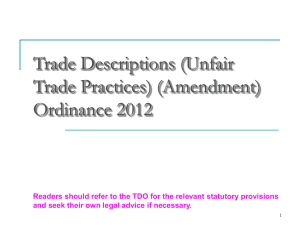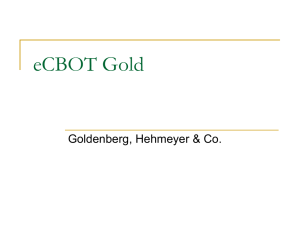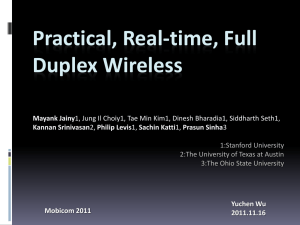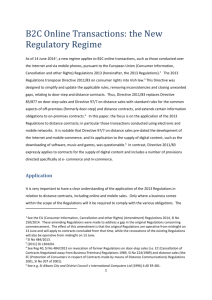DISTANCE SELLING
advertisement
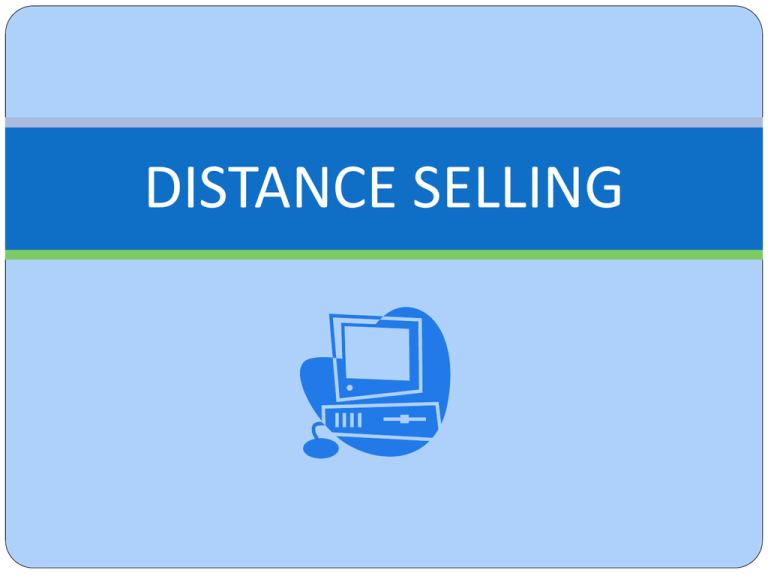
DISTANCE SELLING INTRODUCTION Distance contracts are controlled by the Consumer Contracts (Information, Cancellation and Additional Charges) Regulations 2013, which came into force on the 13th June 2014. The Regulations apply to the majority of contracts made by distance between a trader and consumers within the EU. LEGAL JARGON What is a ‘distance contract’? A contract concluded between a trader and a consumer under an organised distance sales or service provision scheme without the simultaneous physical presence of the trader and the consumer, with the exclusive use of one or more means of distance communication up to and including the time at which the contract is concluded. WHAT DOES THIS MEAN IN PRACTICE? The Regulations place various obligations on traders and provide consumers with statutory rights when a contract is made exclusively by distance (without face to face contract) using an organised method of sale. Means of distance communication, include: Internet Text messaging Phone calls Mail order – catalogues, mail order advertising Interactive TV WHY WERE THE REGULATIONS INTRODUCED? An increasing number of people buying goods and services online To give confidence to consumers to encourage them to buy goods and services by distance To allow consumers to make informed decisions To create a level playing field To provide consumers with an opportunity to look at the goods and change their mind before purchase as if they were in a shop ARE THERE ANY CONTRACTS WHERE THE DSRs DON’T APPLY? Gambling Financial services (but the Financial Services (Distance Marketing) Regulations 2004 will probably apply) Sale of land Residential rental of accommodation Construction of buildings Supply of food, drinks etc. for current consumption supplied by a trader on frequent/regular rounds Package travel/holidays/tours Timeshare, long term holiday products, resale and exchange contracts Concluded via vending machines Concluded via calls from public pay phones Goods sold to meet a legal requirement INFORMATION TO BE PROVIDED BEFORE A SALE Description of the goods or services Trader’s identity e.g. trading name Geographic address at which the trader is established and all other contact details * Where appropriate the address and identity of the original trader * Geographic address of the place of business of the trader (if different)* Total price including tax, or details of how the price can be calculated e.g. £/kg Details of delivery costs and any other costs – if not provided consumer will not have to pay Where contracts are subscriptions or ongoing the total cost per billing period or a monthly cost – if not provided consumer will not have to pay The cost of the communication where it exceeds the basic rate e.g. premium rate calls * INFORMATION TO BE PROVIDED BEFORE A SALE Arrangements for payment, delivery, performance and when the contract will be fulfilled * Trader’s complaint handling policy (where applicable) * Cancellation rights – conditions, time limit, procedures for exercising rights Goods – state if the consumer is expected to return the goods at their own cost * - if not provided consumer will not have to pay Goods – if the goods can’t be returned by post advise the cost of return * Services – where a consumer can agree for a service to start within the cancellation period advise that they will have to pay reasonable costs for the service up to the time of cancellation * State if there are no cancellation rights for specific goods or there are circumstances where consumers lose their right to cancel * Make consumers aware of any after-sales assistance, services or guarantees offered and applicable conditions * INFORMATION TO BE PROVIDED BEFORE A SALE Inform consumers of any code of conduct membership and how to obtain a copy of the code * If the contract is of fixed duration inform consumers If the contract is of no fixed length or can be automatically extended state the termination conditions If the contract is of minimum length inform consumers * If deposits are required inform consumers and of any conditions attached * Provide information relating to digital content functionality where appropriate e.g. language, duration, file type * Provide information relating to digital content compatibility * Advise of the existence of any alternative dispute resolution schemes and how to access them * * Information marked * can be provided in a different but appropriate way if space/time is limited. MODEL CANCELLATION FORM (if a right of cancellation exists the consumer must be given or have access to the prescribed cancellation form. Failure=breach of contract) Model Cancellation Form To [here the trader’s name, geographical address and, where available, fax number and email address are to be inserted by the trader]: I/We [*] hereby give notice that I/We [*] cancel my/our contract of sale of the following goods [*] / for the supply of the following service [*], Ordered on [*] / received on [*], Name of consumer(s), Address of consumer(s), Signature of consumer(s) (only of this form is notified on paper), Date [*] Delete as appropriate ELECTRONIC SALES The following information must be brought to the consumer’s attention immediately before they place their order: Description of the goods or services Total price including tax, or details of how the price can be calculated e.g. £/kg Details of delivery costs and any other costs Where contracts are subscriptions or ongoing the total cost per billing period or a monthly cost If the contract is of fixed duration inform consumers If the contract is of no fixed length or can be automatically extended state the termination conditions If the contract is of minimum length inform consumers ELECTRONIC SALES Other things to do: Consumers must expressly acknowledge they are under an obligation to pay when they place their order – e.g. a button saying ‘pay now’ Inform consumers at the beginning of the ordering process whether any delivery restrictions apply and that by paying they accept that CONCLUDING A CONTRACT BY PHONE The conversation must be started with: Identity Identity of the person on whose behalf the call is being made Commercial purpose of the call INFORMATION TO BE PROVIDED AFTER A SALE Confirmation must be given to a consumer: Must be in a durable medium Must include the ‘information to be provided before a sale’ if it hasn’t already been provided in a durable medium Must be given no later than: When the goods are delivered Before performance of a service begins Within a reasonable time for digital content LEGAL JARGON What is ‘durable medium’? Paper or email or any other medium that: Allows information to be addressed personally to the recipient Enables them to store the information in a way accessible for future reference for a period long enough for the purposes of the information Allows the unchanged reproduction of the information stored CARRYING OUT A CONTRACT Deliver within any timeframe agreed If no timeframe was agreed then deliver without undue delay and within 30 days following the day the contract was made Where a trader refuses to deliver goods, they fail to deliver within the agreed time and time was an express term of the contract, or the appropriate delivery period was not met the consumer can treat the contract as being at an end and request a full refund Goods remain at the trader’s risk until they are delivered into the physical possession of the consumer or other specified person ARE THERE CONTRACTS THAT CONSUMERS CAN’T CANCEL? Medicinal products/services that are dispensed on prescription or are available free under NHS arrangement Contract for transport services e.g. rail or flight tickets Where the price depends on fluctuations in financial markets not controlled by the trader (but not utilities) Goods made to the consumer’s own specifications Perishable goods Alcoholic drinks where the contract has a fixed price, delivery can only take place after 30 days or the price depends on fluctuations in market fluctuations not controlled by the trader e.g. vintage wine Where a consumer has specifically requested a trader to call to carry out urgent repairs or maintenance – doesn’t apply to other services provided at the same time Newspapers, periodicals, magazines – but subscriptions retain a cancellation right Goods concluded at a ‘public auction’ – does not exempt online auctions Supply of accommodation, transportation of goods, vehicle rental services, catering, services related to leisure activities if there is a specific date or period for performance Sealed goods due to health protection or hygiene reasons that have been unsealed by the consumer Audio/video recordings or computer software which have been unsealed Where goods have been combined with other goods after delivery so that they are inseparable CANCELLATION RIGHTS Withdraw an offer before the trader has accepted it Cancel a contract within a specified period of time CANCELLATION PERIODS Contract Type Cancellation Period • Service contract • Digital content contracts when not supplied on a tangible medium 14 days following day contract made • Sales contract (goods or goods and services) 14 days following day contract made (unless consumer has requested the download to start, has acknowledged they will lose cancellation right, and has been given required information) • Sales contract for multiple goods delivered on different days 14 days following day last of goods are delivered • Sales contract for multiple lots/pieces delivered on different days 14 days following day last of lots/pieces are delivered • Sales contract for regular delivery of goods for a period over 1 day 14 days following day first of goods are delivered Where a trader fails to provide consumers with information about the right to cancel the cancellation period is extended to 14 days following the day the information is provided (up to 12 months from the day after the end of the normal cancellation period) HOW DOES A CONSUMER CANCEL? There is no set requirement but they can: Use the model cancellation form Use any other clear statement Use an online cancellation option which the trader must acknowledge Cancellation is effective from the time SENT WHAT IF A CONSUMER CANCELS? Goods must be collected from the consumer where appropriate Where a consumer is responsible for returning the goods they must do so within 14 days of informing the trader of their decision to cancel A consumer will be responsible for the cost of returns unless the trader agrees to pay but this information must be clarified before the contract is made Money must be reimbursed without undue delay and within 14 days of the goods being returned, or for a service within 14 days of cancellation Reimbursement must include all money paid and includes the cost of delivery Where a consumer has requested a more expensive delivery method reimbursement can only include the basic delivery cost Reimbursement must be made using the payment method unless agreed otherwise No fees may be imposed in relation to the reimbursement e.g. restocking fees A trader may deduct an amount from the reimbursement if the value of the goods has been diminished through handling beyond what is necessary BUT a consumer has the right to reasonably examine the goods Any ancillary contracts should also be terminated with no cost WHAT IF A SERVICE CONTRACT STARTS IN THE CANCELLATION PERIOD? A service can only begin in the cancellation period where a consumer expressly requests it A consumer loses the right to cancel where a service contract has been performed fully provided they requested and acknowledged this This also applies to digital content which is downloaded/streamed Where a contract is for goods and services and the service element has been completed the goods may still be cancelled and the cost reimbursed, whilst the service must be paid for A FEW RANDOM POINTS... Additionals linked to the main contract (e.g. Gift wrapping, insurance etc.) must not be the default option Charges for telephone helplines must not exceed the basic rate (numbers starting 09, 084, 0871, 0872, 0873, 0870 do not comply) If a consumer receives unsolicited goods they do not have to pay for them, they can keep them as an unconditional gift, and do not have to take any action If the final day of any time limit within the Regulations lands on a bank holiday a further working day is added WHAT IF A TRADER FAILS TO COMPLY? A consumer may cancel their contract A breach may constitute a criminal offence under the Consumer Protection from Unfair Trading Regulations 2008 If terms of an agreement are unfair or restrict consumers’ rights there may be a breach of the Unfair Terms in Consumer Contracts Regulations 1999 If a breach affects the collective interests of consumers an enforcement order may be applied for to make a business stop behaving in a certain way Q&A Business guidance can be provided by Trading Standards who are happy to review any terms and conditions for compliance with consumer protection legislation. Contact us: Community Safety Trading Standards 01803 208025 www.torbay.gov.uk/tradingstandards
